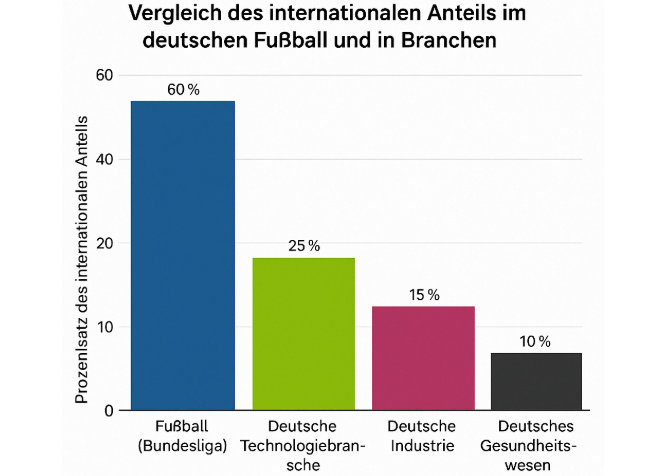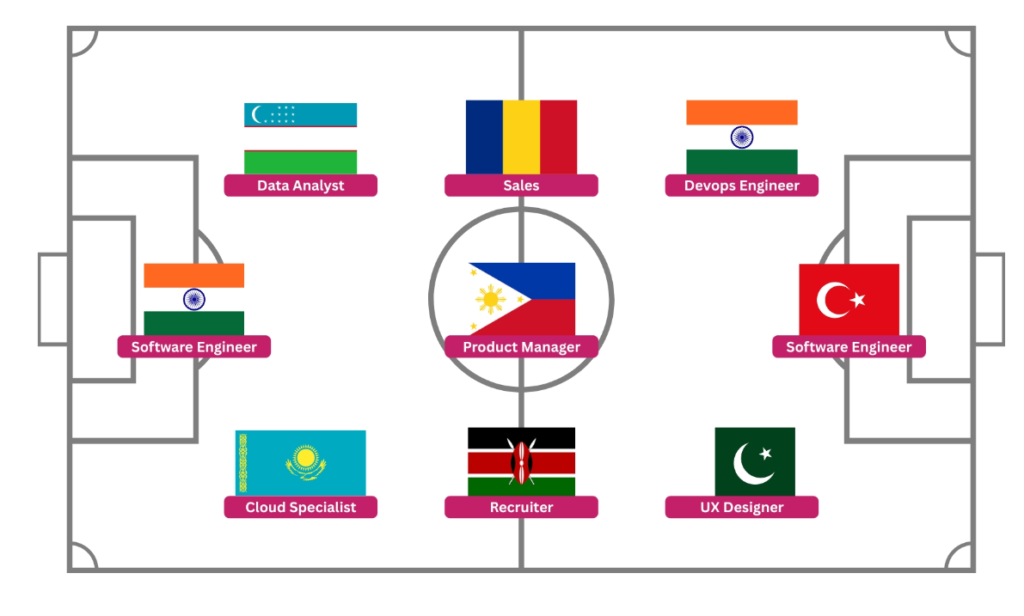What Companies Can Learn from Football
1. Global Recruitment is a First League Thing
In football, top-tier clubs—referred to as “First League” teams—have the courage and foresight to scout talent worldwide. Similarly, businesses in competitive industries understand that recruiting internationally is a crucial strategy for maintaining their edge.
Why Global Recruitment is a First-League Thing for Top-Tier Clubs and Businesses:
- Resource Availability: Top-tier clubs like Bayern Munich, Borussia Dortmund, and RB Leipzig can afford to scout talent from around the world, just as leading businesses can invest in international recruitment. These clubs have extensive scouting networks to manage international transfers, just as businesses have the resources to navigate international hiring, such as visas and relocation packages.
- Strategic Advantage: Global recruitment provides a strategic advantage, ensuring that teams and businesses are not limited by local talent pools. Clubs like Bayern Munich, with their international focus, have built squads capable of competing in the Champions League, while businesses can leverage global talent to innovate and grow.
Example of Global Recruitment in Business: Companies like Siemens and SAP in Germany have leveraged global talent to stay ahead of their competition. These companies recruit internationally, tapping into diverse talent pools to fill key roles and drive innovation.
In football, global recruitment is a hallmark of top teams, and in business, it’s a vital strategy for staying competitive. Just as Bayern Munich and other top German clubs rely on international players to enhance their squads, businesses must also recruit globally to stay ahead of the curve.
Voices: HR Leaders on Global Recruitment
- “In today’s talent-driven economy, businesses cannot afford to think locally when scouting for talent. The competitive advantage lies in tapping into global talent pools where innovation and fresh perspectives flourish.” — Anna Carter, Global HR Director, Siemens.
- “Much like top football clubs who recruit across the globe, our business thrives when we leverage different skill sets from different corners of the world. We’re no longer limited by geographical constraints.” — David Lewis, CEO, TalentFlow Consulting.
Modern Example:
Remote Work Impact on International Scouting: With remote work on the rise, the hiring landscape has expanded significantly. Just as football clubs like Bayern Munich can scout talent worldwide, businesses can now recruit and onboard professionals from diverse regions without relocation costs. Recruitment platforms like Talents2Germany have streamlined this process, offering a more cost-effective and efficient approach to global hiring.


2.Different Top Performer Clubs and Their International Players
Top football clubs, particularly in Germany, have embraced international recruitment, and their teams are often a blend of local and global talent. These teams benefit not only from the technical abilities of their international players but also from the unique perspectives they bring.
Examples of Top German Clubs and Their International Players:
- Bayern Munich: Bayern Munich is one of the best examples of a German club with a strong international presence. Players like Kingsley Coman (France), Robert Lewandowski (Poland), and Thiago Alcántara (Spain) have added a diverse mix of playing styles to the club, enabling them to remain competitive on the European stage.
- Borussia Dortmund: Dortmund has similarly recruited international talents, including Jude Bellingham (England), Axel Witsel (Belgium), and Raphaël Guerreiro (Portugal). Their international presence enhances Dortmund’s dynamism and their ability to challenge for titles in Europe.
- Liverpool: Known for nurturing international talent, Liverpool has integrated players like Mohamed Salah (Egypt), Sadio Mané (Senegal), and Virgil van Dijk (Netherlands). Their ability to find and develop talent internationally has made them a dominant force in both the Premier League and Europe.
These international players bring valuable skills and experiences, contributing to the clubs’ ability to compete at the highest levels, such as in the UEFA Champions League. The integration of global talent into their squads highlights the importance of international recruitment in football.
Voices: Insights from Football Scouts
- “Scouting in football is as much about identifying raw potential as it is about finding the right cultural fit for the team. This is no different from recruitment in business, where an employee must mesh with the team’s dynamics.” — Michael Novak, Senior Scout, FC Bayern Munich.
- “In football, agents help players navigate global markets, much like recruitment consultants assist businesses in finding the perfect candidate who can adapt and excel within a company’s culture.” — Oliver Schulz, Director of Football Recruitment, Borussia Dortmund.


3. Comparison: Who Has More International Talent?
In football, there’s a noticeable contrast between high-table and low-table clubs in terms of the diversity and international scope of their rosters. Top clubs with greater resources and more substantial scouting networks tend to have a higher proportion of international players, while clubs lower in the standings may have a more domestic focus, often due to financial constraints or limited scouting reach.
High-Table Clubs vs. Low-Table Clubs
Top Clubs (High Table)
- Bayern Munich: Bayern consistently recruits the best talent from around the world, with players from major European and international markets.
- Borussia Dortmund: Like Bayern, Dortmund scours international markets for top talent, ensuring their squad includes a wide range of nationalities and playing styles.
- RB Leipzig: Leipzig’s strategy of recruiting young international players from a range of countries has made them a competitive team in both the Bundesliga and European competitions.
Lower-Table Clubs
- VfL Wolfsburg: While still a Bundesliga club, Wolfsburg has fewer international stars compared to Bayern or Dortmund. The team often focuses on players from neighboring European countries.
- FC Augsburg: A club generally fighting relegation, Augsburg has a smaller international presence, relying more on local talent and players from within Europe.
International Players by Club and Last Bundesliga Placement
Club | Notable International Players | Countries Represented (non EU) | Total Non-EU International Players | Total International Players | Last Bundesliga Placement (2023/2024) |
Bayern Munich | Sadio Mané (Senegal), Minjae Kim (South Korea), Noussair Mazraoui (Morocco) | Senegal, South Korea, Morocco | 3 | 10 | 1st (Champions League Qualification) |
Borussia Dortmund | Sébastien Haller (Ivory Coast), Karim Adeyemi (Nigeria), Gio Reyna (USA) | Ivory Coast, Nigeria, USA | 3 | 9 | 2nd (Champions League Qualification) |
RB Leipzig | Amadou Haidara (Mali), Mohamed Simakan (Ivory Coast) | Mali, Ivory Coast | 2 | 7 | 3rd (Champions League Qualification) |
VfL Wolfsburg | Rogério (Brazil), Mohammed Amoura (Algeria) | Brazil, Algeria | 2 | 6 | 8th (Europa Conference League) |
FC Augsburg | Carlos Gruezo (Ecuador), Iago (Brazil), Noahkai Banks (USA) | Ecuador, Brazil, USA | 3 | 5 | 13th (Mid-table finish) |
Key Insights: The Power of Global Talent in Football and Business
Bundesliga and the Global Recruitment Advantage
Bayern Munich (1st place) leads the Bundesliga by consistently investing in international talent. Their strategy of recruiting top players from across the globe is a cornerstone of their domestic dominance and continued success in European competitions.
Borussia Dortmund (2nd place) also benefits from a strong international player base. Their recruitment strategy helps them remain competitive in both national and international football.
RB Leipzig (3rd place) stands out as a high-performing club with a dynamic, young international squad. Their global scouting and development focus keeps them near the top of the league and ensures regular Champions League participation.
In contrast, VfL Wolfsburg (8th place) and FC Augsburg (13th place) have fewer international players and sit lower in the standings. This may reflect more limited international scouting efforts or resource constraints. Their more regional recruitment approach could be a contributing factor to their mid-to-lower table positions.
This comparison highlights a clear trend: clubs that invest in international recruitment tend to perform better. The league standings reflect not just player skill but also the impact of strategic global talent acquisition.

4. Great Scouts Find Talent in Unexpected Places
In today’s globalized workforce, companies must look beyond local talent pools to discover high-potential professionals worldwide. Just as elite football clubs like Bayern Munich and Borussia Dortmund scout players across Africa, South America, and Asia, businesses should expand into international markets and embrace remote work to uncover hidden talent.
Key Advantages of Global Recruitment:
- Access to Hidden Talent
By looking beyond traditional talent hubs, companies can discover skilled professionals in emerging markets. Siemens, a global engineering leader, has built diverse teams by hiring top talent from across regions and integrating them through structured onboarding. This approach fosters not only diversity but also creativity and innovation. - Cost Efficiency
Recruiting in global markets can significantly reduce costs, especially in regions with lower salary expectations. Emerging tech hubs such as Bangalore (India), Kraków (Poland), Medellín (Colombia), and Ho Chi Minh City (Vietnam) offer access to skilled professionals with lower operational overhead compared to major tech centers. - Competitive Edge
Companies that limit hiring to local markets risk missing out on exceptional candidates. Expanding recruitment to less saturated regions allows access to top talent at a lower cost — a distinct competitive advantage in fast-moving industries. - Diversity Fuels Innovation
Building diverse teams through international hiring enhances creativity, problem-solving, and decision-making. Just as football teams benefit from players with different styles and backgrounds, companies thrive when they embrace culturally and professionally diverse perspectives. This cross-pollination of ideas drives innovation and sustainable success.
Business Application:
To stay ahead, companies should recruit in “second cities” and emerging sectors — areas rich in talent but with less hiring competition. This strategy not only brings in top global professionals but also positions businesses for long-term growth in an increasingly interconnected world.
5. Emerging Tech Hubs and Football Talent Regions
Country | Tech Hub (City) | Example (Tech) | Football Talent Region | Example (Football Talent) |
Moldova | Chișinău | Allied Testing – QA firm working with European finance clients | Moldova | Ion Nicolaescu – All-time top scorer for Moldova |
Georgia | Tbilisi | Bank of Georgia’s fintech division – investing in blockchain and neobanking | Georgia | Khvicha Kvaratskhelia – Napoli winger |
Serbia | Belgrade | Vega IT – software solutions for EU clients | Serbia | Dušan Vlahović – Juventus striker |
North Macedonia | Skopje | Seavus – global software development and consulting | North Macedonia | Elif Elmas – Napoli midfielder |
Armenia | Yerevan | Hexact – AI startup providing automation insights for global businesses | Armenia | Eduard Spertsyan – National team key player |
Kosovo | Pristina | JCoders Academy – youth tech education and upskilling | Kosovo | Milot Rashica – Beşiktaş forward |
Nigeria | Lagos | Andela – remote developer accelerator, founded in Lagos | Nigeria | Victor Osimhen – Napoli striker, AFCON top scorer |
Vietnam | Ho Chi Minh City | Axon Active – Swiss software firm building tech talent in Vietnam | Vietnam | Nguyễn Quang Hải – Ligue 2 playmaker |

6. The Role of Agents in Football vs. Recruitment Advisors in Business
Football agents connect players with clubs — just as recruitment firms and headhunters link companies with top talent. Here’s what companies can learn from football’s talent ecosystem:
- Negotiation & Market Knowledge
Elite agents like Jorge Mendes or Mino Raiola know the true value of talent and understand market trends. Businesses should work with recruiters who understand salary benchmarks and talent availability in their specific industry. - Building Long-Term Relationships
Companies should treat recruiters as long-term partners to develop a strong pipeline of pre-vetted candidates.
Example:
Talents2Germany acts like a football agency for businesses — not only helping recruit talent but also aligning candidates with organizational needs and culture.

7. Case Study: How International Talent Drives Championship Teams
Football proves that internationally diverse teams outperform when integrated effectively. Key players often adapt to new environments, bringing unique skills and perspectives:
- Lamine Yamal (Spain – Moroccan heritage)
Eligible for Morocco but chose Spain, where his mixed playing influences added flair and unpredictability. At just 17, he played a vital role in Spain’s UEFA EURO 2024 victory — showing how young international talent can shape elite teams.
Business parallel: Young global professionals, when properly nurtured, inject innovation and new perspectives into teams. - Miroslav Klose (Germany – born in Poland)
Germany’s all-time top scorer, born in Poland, thrived after relocating and adapting to Germany’s system. He led Germany to a World Cup win in 2014.
Business parallel: Migrant professionals, when well-integrated, become high-performing leaders in new environments. - Mesut Özil (Germany – Turkish heritage)
Özil’s multicultural background shaped his unique playstyle and vision, contributing to Germany’s 2014 World Cup win.
Business parallel: Diverse teams bring fresh approaches to problem-solving and innovation.
These examples highlight a simple truth: globally sourced talent — when effectively onboarded — boosts performance, whether in football or business.
8. Retaining Talent Through Strong Culture
Football clubs that foster belonging and purpose — like FC Barcelona’s “Més que un club” philosophy — retain top players longer. Similarly, companies that invest in strong culture, work-life balance, and employee retention strategies are more likely to hold onto their best talent long term.
Example:
Google and Microsoft prioritize employee well-being, mirroring how top clubs create environments where individuals feel valued, supported, and loyal.

Talents2Germany: A Scout for International Talent
Top football clubs invest heavily in scouting networks, tracking emerging players across different leagues before they become household names. The best teams don’t just look at statistics—they evaluate potential, adaptability, and the ability to thrive under pressure. Similarly, Talents2Germany applies data-driven talent identification to pinpoint professionals who are not only qualified but also capable of excelling in new environments.
Many businesses limit their hiring to traditional talent hubs, leading to fierce competition over a shrinking pool of professionals. Talents2Germany helps companies expand their search beyond borders, tapping into underutilized markets with highly skilled candidates who might otherwise be overlooked. Whether it’s sourcing software engineers from Bangalore, AI specialists from Eastern Europe, or automation experts from Latin America, Talents2Germany ensures businesses are not just hiring, but hiring strategically.
Navigating global hiring comes with challenges—work permits, visa processes, and cultural integration often create barriers for companies looking to recruit internationally. Talents2Germany streamlines these complexities, offering end-to-end solutions that handle everything from compliance to onboarding, allowing businesses to focus on what matters most: growth and innovation.
With a scout-like approach to international hiring, Talents2Germany doesn’t just fill vacancies—it builds future-ready teams that give companies a competitive edge in an increasingly borderless job market.
Conclusion
Football proves that identifying and integrating international talent leads to winning teams. Businesses can apply these same principles by scouting globally, investing in development, and fostering inclusive work cultures. By doing so, they can stay ahead of the competition and build high-performing teams—just like the world’s best football clubs.

